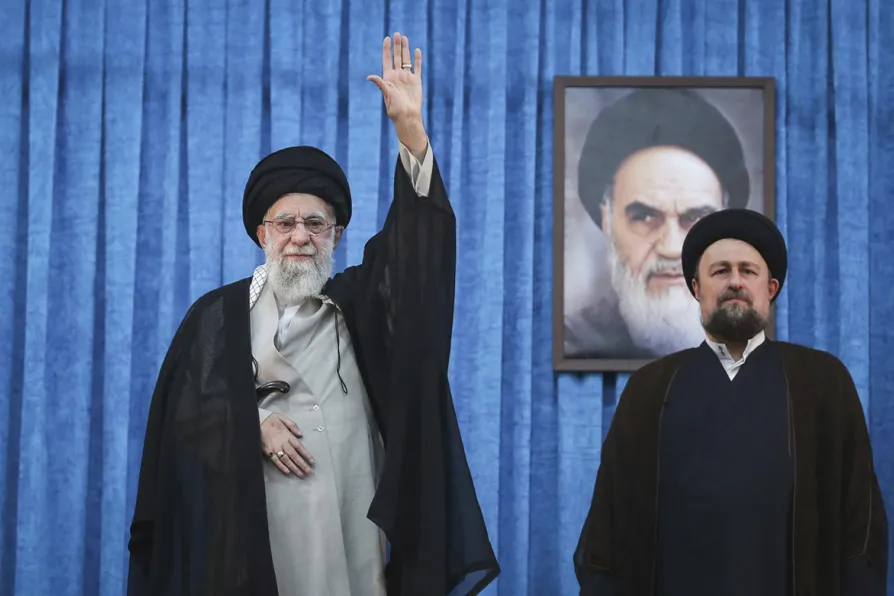As the regime in Iran continues to face international pressure to reduce its nuclear programme, workers continue to struggle for wages they can live on despite harsh repression of trade unionists, reports JAMSHID AHMADI

 Supreme Leader Ayatollah Ali Khamenei waves to the crowd as he arrives for a ceremony marking the anniversary of the 1989 death of the late revolutionary founder Ayatollah Khomeini, shown in the poster in background, as Ayatollah Khomeini's grandson Hass
Supreme Leader Ayatollah Ali Khamenei waves to the crowd as he arrives for a ceremony marking the anniversary of the 1989 death of the late revolutionary founder Ayatollah Khomeini, shown in the poster in background, as Ayatollah Khomeini's grandson Hass
IN VIOLATION of International Labour Organisation Conventions 87 and 98, which guarantee the freedom to establish independent organisations and the right to professional protest, the security forces of the Iranian regime raided protest gatherings of teachers on May 1.
According to a report by the Iranian ILNA news agency, six teachers were arrested. Two of those detained were later released. Regarding the status of the arrested teachers, ILNA contacted education officials on May 4 and reported: “After hours of follow-up, no official was willing to respond.”
However, according to media reports, teachers Vali Mirza Seyyedi, Ahmad Heidari, Hossein Abadian and Mehdi Farrahi Shandiz were held. ILNA reported that Abadian was released on bail on May 9 and Seyyedi was released on May 10. The continued arrest and detention of teachers underscores the regime’s systematic efforts to stifle dissent within the educational sector.
According to the Co-ordination Council of Iranian Teachers’ Associations (CCITTA), “The authorities attempted to prevent this collective action through heavy security pressures, summonses, telephone threats and arrests of union activists.
“Security forces exerted severe pressure on union activists. Summonses and telephone threats increased to such an extent that some teachers even received text messages threatening them that participation in gatherings was illegal.”
Despite the intense security atmosphere, teachers demonstrated a strong presence in protest gatherings across Iran, including in the capital, Tehran.
Protests by university retirees, on the issue of the non-implementation of salary equalisation, took place in April, with protesters coming to Tehran from across the country. Retired educators have emphasised the decreasing purchasing power of their pensions.
Kourosh Shariati, a representative of informal pre-school teachers, literacy movement instructors, stated: “The reality is that the Ministry of Education needs these teachers due to a shortage of staff, but the government and parliament as a whole have so far not agreed to formalise the employment status of these teachers for various reasons.”
Teachers are demanding wages above the poverty line and free education for their students. It is critical to note that the minimum wage set by the regime for 2025 covers only about 52 per cent of a household’s basic needs, falling drastically short of the poverty line, which is estimated at approximately $400 per month for a family of three, compared to the current minimum wage of around $120. This severe disparity fuels widespread discontent.
A particularly alarming development in recent weeks is the Ministry of Education’s directive issued on May 4, allowing provincial officials to hire clerics and seminary students as teachers.
This move comes amid a significant teacher shortage and a refusal to hire thousands of qualified education graduates, raising concerns about the politicisation and militarisation of schools following student participation in the 2022 nationwide protests. This policy further undermines the professionalism and dignity of qualified educators in favour of ideological loyalty.
In April, the minister of education in President Massoud Pezeshkian’s government signed a so-called joint memorandum of understanding with the commander-in-chief of the law enforcement force.
In response, the CCITTA emphasised the need for the “cancellation of all judgements issued by security offices and administrative disciplinary boards against educators and student-teachers due to union activities,” while also demanding the “cancellation of any contract or memorandum of understanding that leads to the interference or entry of law enforcement and security forces into the school environment.” These demands are even more pressing given the recent directive to embed clerics into schools.
Iranian teachers’ unions have also issued statements of strong solidarity with the nationwide truck drivers’ strike, which began on May 19 and has since spread to 152 cities across all 30 provinces in Iran. The teachers’ council cited “nearly half a century of Islamic Republic rule and rising economic problems affecting vulnerable groups, including workers, teachers and retirees,” underscoring the shared struggles and the systemic nature of the crisis. This growing cross-sectoral solidarity represents a significant challenge to the regime.
Opposition forces inside Iran stress that Pezeshkian’s government is implementing the anti-popular policies of Khamenei and the suppressive regime’s security apparatus. They stress that, through persistent organisation and struggle, particularly by movements demonstrating such broad solidarity, the corrupt and oppressive ruling regime can be forced to retreat and be replaced by a democratic and national government.
For such a development to take place, international solidarity is essential. The Committee for the Defence of Iranian People’s Rights calls upon all trade unions in Britain and across the world to join its call for practical action in support of the struggles of Iranian workers, for peace, democracy and social justice.
Jamshid Ahmadi is the assistant general secretary of Codir (www.codir.net).










